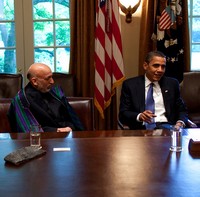It is still too soon to tell what effect, if any, Sunday’s appalling massacre of 16 innocent civilians by a U.S. soldier will have on the war in Afghanistan or on the relationship between the United States and the government of Afghanistan. This apparent war crime arrives fast on the heels of the infamous Quran burning incident that led to both riots across Afghanistan as well as the murder of several U.S. servicemen by the Afghans they were meant to be advising.
Taken cumulatively, these events lead many to conclude that the U.S. and allied war in Afghanistan has reached a bitter nadir, with trust at an all-time low on both sides. The American people are anxious to bring the troops home, U.S. interests be damned, and feel certain the United States does not have a viable partner in either the people or government of Afghanistan. It is worth taking a step back, though, to consider the trajectory of U.S. and allied efforts in Afghanistan since President Barack Obama took office in 2009, in order to put these attacks in some context and also to identify the key issues ahead that this latest incident might yet affect.
Governments that face a persistent insurgency are by definition governments that have a problem with their legitimacy -- as the late Seymour Martin Lipset put it, a sizeable minority of the population no longer feels that existing institutions are those most appropriate for society. Normally, the goal of a counterinsurgency campaign as prosecuted by a third party, such as the U.S.-led coalition in Afghanistan, is to either buy time and space for the host nation to push through political reforms necessary to increase the legitimacy of the government or to buy time and space to allow for some kind of negotiated political settlement with the insurgent forces.

